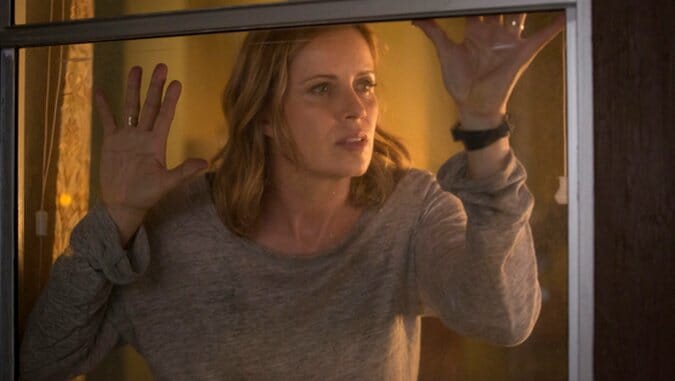Fear the Walking Dead: “Not Fade Away”
Photo by Justin Mintz/AMC
Shane Ryan and Josh Jackson review Fear the Walking Dead each week in a series of letters, just as they’ve done for The Walking Dead.

Josh,
Lou Reed’s “Perfect Day” is one of my favorite songs, and any episode of television that begins with that sad, dirge-like melody is okay by me. End of review.
Okay, not really—Reed alone isn’t enough to give away free praise. But my gut reaction after finishing “Not Fade Away” is that we’re starting to head in the proper direction, and that I feel positive about Fear the Walking Dead for the first time since the pilot. The last two episodes had so many false moments infesting the narrative that I admit to losing most of my hope. Last night, finally, we got back to what matters, and we may have found what works.
One thing we’ve talked about before in our Walking Dead reviews is how the dialogue isn’t always the strongest—the show has its highbrow moments, but we’re not dealing with the writing staff of The Sopranos here. I think the same can be said for FTWD, and what made this episode so great was the lack of over-explaining, which in turn diminished the groan-inducing moments.
The truth is that in either zombie show, the writers can’t go very far in dialogue-heavy scenes without running headfirst into a cliche. We saw it to some extent this week, with the stereotypically arrogant, dismissive lieutenant strutting around, threatening force, cursing at golf balls, and generally being an unrealistic douchebag. And we saw it with the way Travis dismissed Chris’ video by defaulting to a very standard horror trope—”I’m so insistent that everything is normal that I’m not even going to look at the very obvious evidence proving I’m wrong.”
By and large, though, there were fewer of those cliches to be found. Instead, the ominous atmosphere was built slowly, by unsettling degrees, until it had become a tangible organism. Actually, ‘rebuilt’ might be the better term, since this hour of TV was about recovering what had been lost after the pilot. There was something definitely menacing about both the army and the visiting doctor, even though both profess to having the best intentions. We know, in our guts, that they’re going to commit some kind of atrocity, and the best scene of the whole episode was Daniel’s mini-monologue touching on the motivations behind evil acts, and how it makes no difference whether they are driven by malice or fear—the bodies in the rivers of El Salvador, or the streets of Los Angeles, are just as dead.
That pervasive sense of dread builds to the climax, when the army takes not just Griselda, but also Nick, who has been outed as a dope fiend. The way they’re ripped out of their household has historical echoes in the terror from which the Salazars escaped—the people who are disappeared, and who will never return alive. Even Travis, alone on the roof and spotting gunfire in the window of the house he wanted so badly to ignore, is starting to get the point.
There were some poetic bookends, too, first by Chris and last by Alicia, that I never would have expected to work if you’d pitched the concept after last week’s episode. But they did work, and so did Madison’s anger at Nick, and later the anguish when she lost him. Hopefully, as we near the end of the short first season, the writers of FTWD will look at these moments and realize that they pack a punch, and that we don’t need artificial suspense driven by cliche in order to achieve emotional impact.
So, Josh, in what has been a very inconsistent show so far, the needle ticks upward—at least for me. What did you think?
-

-

-

-

-

-

-

-

-

-

-

-

-

-

-

-

-

-

-

-

-

-

-

-

-

-

-

-

-

-

-

-

-

-

-

-

-

-

-

-








































